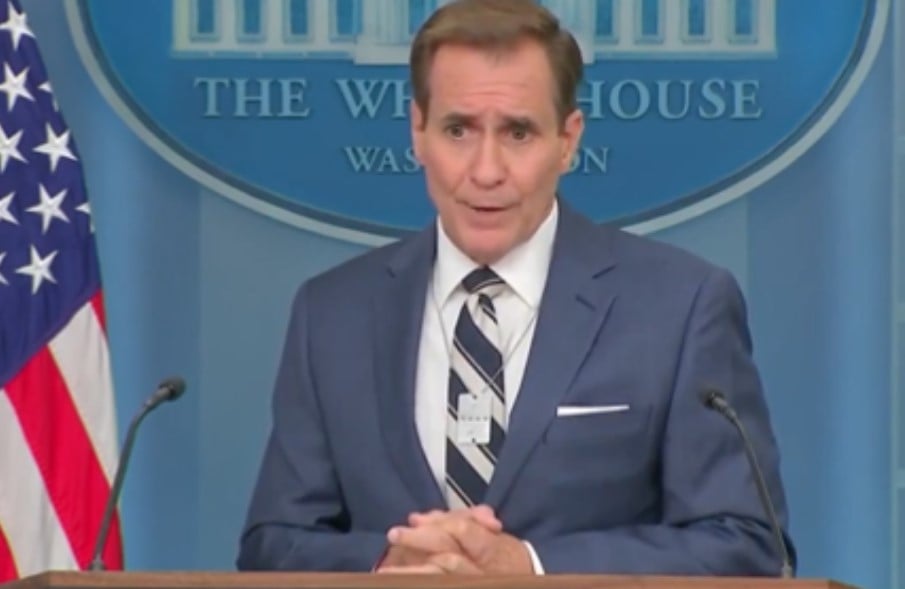The letter gives Israel 30 days to implement 15 policy changes, including 10 measures to ‘surge all forms of humanitarian assistance throughout Gaza.’
By Andrew Bernard, JNS
The White House confirmed the contents of a letter from the Biden administration to the Israeli government demanding that it increase humanitarian aid to Gaza or risk losing access to U.S. military equipment.
The letter, dated Oct. 13 and first reported by Axios, is addressed to Israeli Defense Minister Yoav Gallant and Strategic Affairs Minister Ron Dermer from U.S. Secretary of State Antony Blinken and Secretary of Defense Lloyd Austin.
John Kirby, the White House national security communications advisor, told reporters at a briefing on Tuesday that the letter was prompted by a “recent decrease in humanitarian assistance reaching the people of Gaza.”
“I can confirm that Secretary Austin and Secretary Blinken co-signed the letter you’re talking about, and it was sent to their Israeli counterparts,” Kirby said.
“I would note that the Biden-Harris administration made a similar request for concrete measures with respect to humanitarian assistance back in April with a similar letter, and that letter did receive a constructive response from the Israelis.”
The Oct. 13 letter references “important improvements” in humanitarian aid delivery to Gaza after the Biden administration sent the April letter, but notes that since then, humanitarian aid deliveries have declined 50%.
It also said that a new channel between the two governments was needed to discuss “civilian harm incidents” because “our engagements to date have not produced the necessary outcomes.”
It gives Israel 30 days to implement 15 policy changes, including 10 measures to “surge all forms of humanitarian assistance throughout Gaza” or risk losing access to U.S. military materiel.
Kirby in his briefing suggested that the letter was not intended as an ultimatum and that it was simply restating U.S. legal requirements for the transfer of arms under the Leahy Laws and U.S. President Joe Biden’s national security memoranda 18 and 20, which describe the conditions under which Washington is allowed to transfer arms to a foreign power.
“The letter was not meant as a threat,” Kirby said. “The letter just simply restates what we made clear to the Israelis back in April in a similar letter, which is, you know, we have to follow the law of the land here.”
“That’s what you can do with your ally,” Kirby added. “It’s not the first time we’ve communicated that to Israel, but hopefully we won’t have to communicate it again.”
UNIFIL
Kirby also discussed Beirut and the United Nations Interim Force In Lebanon in response to questions from reporters.
“The U.N., through UNIFIL, plays an important role, a peacekeeping role in Lebanon and we respect that role. We want everybody to respect that role, including Israel,” he said.
“We’ve told Israel very directly that we oppose their near-daily strikes here in densely-populated areas in Beirut, and we understand that they’re conducting targeted operations that are designed to go after Hezbollah infrastructure, and we recognize that they have a right to do that.”
“But they also have a commensurate responsibility to do it in a way that doesn’t threaten the lives of civilians or U.N. peacekeepers, or, quite frankly, members of the Lebanese armed forces who have suffered some casualties here,” he added. “It’s unacceptable, and we’ve pressed the Israelis for more details about that.”
Kirby added that he is “in possession of no information that confirms that the U.N. was witting in terms of what Hezbollah infrastructure was nested beneath their buildings. I can’t confirm that particular allegation, but again, I can’t confirm that. But it doesn’t diminish our concerns about the lives and livelihoods of U.N. peacekeepers.”
The senior White House adviser told reporters that the Biden administration is not contesting that “Hezbollah, like Hamas, uses hidden facilities underground for storing arms and ammunition, or for facilitating the freedom of movement of their fighters.”
“There’s no challenge to that allegation,” he said.
The White House continues “to believe that a diplomatic initiative is important to pursue, to bring the conflict to an end, up there in the north as well, and to try to prevent further escalation of the conflict in the region,” he said.
“I don’t want to get into the guts of what that diplomacy is considering, in terms of whose role and how it would be facilitated, just except to say that we continue to support a diplomatic initiative and a diplomatic resolution to this.”


